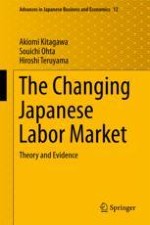2018 | OriginalPaper | Buchkapitel
5. Duration Dependence of Job-Finding Rates in Japan
verfasst von : Akiomi Kitagawa, Souichi Ohta, Hiroshi Teruyama
Erschienen in: The Changing Japanese Labor Market
Verlag: Springer Singapore
Aktivieren Sie unsere intelligente Suche, um passende Fachinhalte oder Patente zu finden.
Wählen Sie Textabschnitte aus um mit Künstlicher Intelligenz passenden Patente zu finden. powered by
Markieren Sie Textabschnitte, um KI-gestützt weitere passende Inhalte zu finden. powered by
